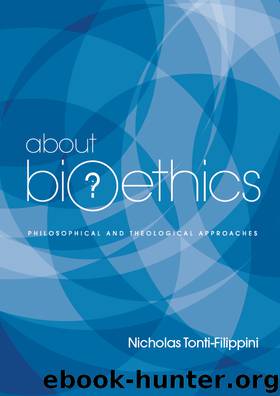About Bioethics, Volume 1 by Nicholas Tonti-Filippini

Author:Nicholas Tonti-Filippini
Language: eng
Format: epub
ISBN: 9781922168184
Publisher: BookPOD
Published: 2013-01-04T16:00:00+00:00
3.7 A Natural Law Ethic
3.7.1 Introduction
St Paul claims that even pagans know God’s law because it is written in their hearts. This is generally referred to as “natural law”. We can thus appeal to natural law rather than to revealed religion on matters of public policy. There are however tensions about what natural law is, its sources, and its teleology. One such tension is over a distinction between synderesis and anamnesis, which may be characterised in terms of a distinction between nature and grace and a distinction between a priori or a posteriori moral knowledge. A second significant tension is over teleology and the difference on that issue separates those who treat natural law anthropocentrically from those who treat it theocentrically. That distinction affects the characterisation of the basic human goods. This section examines the effects those differences have on natural law approaches to evangelization in the public forum of our secular societies, focussing particularly on the challenge of defending the Pauline Principle which is fundamental to a natural law approach but not well understood or accepted in secular discussion. Finally the section draws some conclusions, from that discussion of the sources of natural law and defending the Pauline Principle, about the nature of the task of moral evangelisation in the public forum of western secularism.
3.7.2 Synderesis and Anamnesis
In his encyclical Evangelium Vitae, Pope John Paul II affirmed the right to life in terms of a natural law that results both from reason and from grace:
Even in the midst of difficulties and uncertainties, every person sincerely open to truth and goodness can, by the light of reason and the hidden action of grace, come to recognise in the natural law written in the heart (cf Rom 2:14-15) the sacred value of human life from its very beginning until its end, and can affirm the right of every human being to have this primary good respected…134
The contribution of divine grace and reason to our natural law is something of a tension in our tradition.
Natural law approaches to morality have in common the claim that there are objective moral grounds for knowing what is morally good and bad. One of the tensions over this knowledge is whether it is a priori or a posteriori. Those who follow Augustine may claim that it is a priori because placed directly by God from the outset, and in that sense “written in their hearts”. Others may follow St. Thomas Aquinas in holding that it is a posteriori knowledge, believing that God gave us the capacity to reason and that we can gain knowledge of right and wrong by applying reason to our experiences of our human nature.
Two crucial concepts about which there are differences of opinion are “synderesis” and ‘anamnesis”. Synderesis is the natural or innate ability of the mind to know the first principles of ethics and moral reasoning. The concept is both intellectual and volitional and it fits those versions of natural law that argue for the self evidence of the basic human
Download
This site does not store any files on its server. We only index and link to content provided by other sites. Please contact the content providers to delete copyright contents if any and email us, we'll remove relevant links or contents immediately.
| Administration & Medicine Economics | Allied Health Professions |
| Basic Sciences | Dentistry |
| History | Medical Informatics |
| Medicine | Nursing |
| Pharmacology | Psychology |
| Research | Veterinary Medicine |
Good by S. Walden(3561)
The Social Psychology of Inequality by Unknown(3037)
The Checklist Manifesto by Atul Gawande(2856)
0041152001443424520 .pdf by Unknown(2849)
Get What's Yours for Medicare: Maximize Your Coverage, Minimize Your Costs by Philip Moeller(2755)
The Meaning of the Library by unknow(2576)
Guns, Germs and Steel by Diamond Jared(2374)
Borders by unknow(2319)
23:27 by H. L. Roberts(2253)
And the Band Played On by Randy Shilts(2211)
Being Mortal: Medicine and What Matters in the End by Atul Gawande(2129)
A Leg to Stand On by Oliver Sacks(2041)
The Hot Zone by Richard Preston(2020)
More Than Words (Sweet Lady Kisses) by Helen West(1870)
The Valachi Papers by Peter Maas(1862)
The Laws of Medicine by Siddhartha Mukherjee(1806)
Get What's Yours for Medicare by Philip Moeller(1755)
The Andromeda Strain by Michael Crichton(1747)
The Obesity Epidemic by Robyn Toomath(1681)
